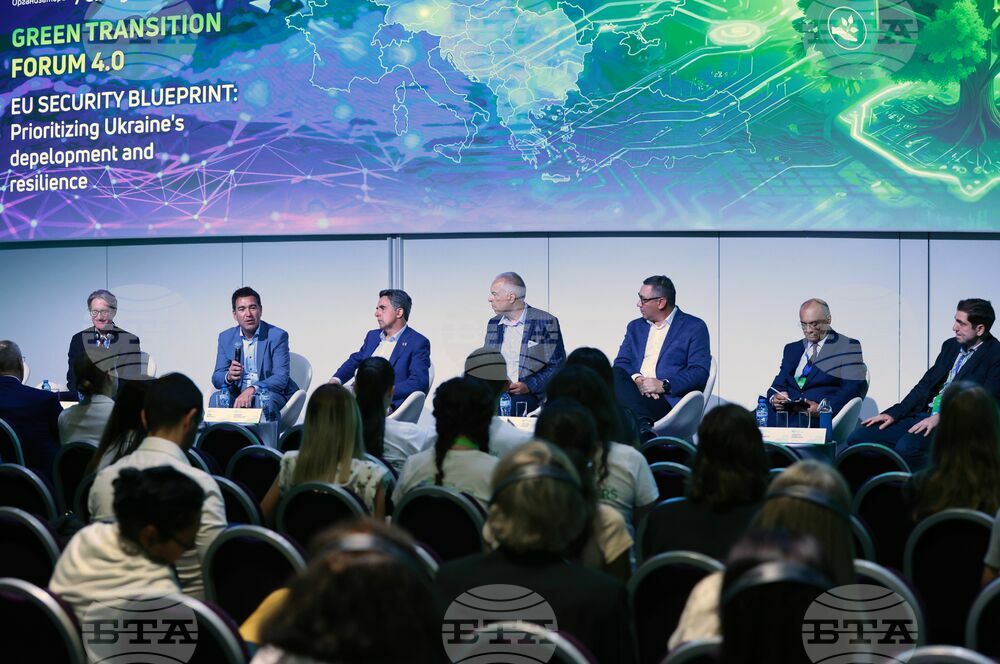site.btaPanellists at Green Transition Forum on Ukraine's Development Talks about Pragmatic Solutions, Mobilizing Financial Resources


Pragmatic solutions, mobilizing financial resources, protecting investors and emergency aid for Ukrainians before winter were some of the topics discussed by the Green Transition Forum panellists in the session on EU’s security plan about Ukraine’s development and resilience on Thursday. The forum is organized by Dir.bg and 3E News with BTA as media partner.
The panel was attended by former President of Bulgaria (2012-2017) Rosen Plevneliev, Prime Minister of Romania (2012-2015) Victor Ponta, Deputy Director of the Energy Community Secretariat Dirk Buschle, Maxim Bondarenko, Head of Investment Consulting at Ukraininvest, Joe Philipsz, Senior Expert on Investment and Infrastructure in CEE, Hristo Panchev, Coordinator at Greenpeace Ukraine, and Matthew Bryza, former senior official at the White House and the US State Department, member of the Board of Directors of Overgas.
“We are witnessing an outrageous, cruel crime against humanity, against the rule of law, against everything we believe in,” Plevneliev commented on what is happening in Ukraine. He added that the war of the future is being fought there and pointed out that this year Ukrainians will produce 1 million drones.
In his words, Ukraine has the "greenest" future from an energy point of view. "The reconstruction of the Ukrainian economy is bound to happen, and the industries of the future will be tested there, including the greenest of them," Plevneliev said. He was adamant that Europeans will be by Ukraine's side for as long as they have to, until Ukraine not only restores its sovereignty but also its economy.
According to Ponta, rebuilding Ukraine's energy sector will be a huge, unprecedented challenge. He noted Ukraine's goal to join the European energy system and have connectivity with nearby countries. He said there will be money for the country's recovery. He also pointed out that a balance should be sought in the reconstruction of Ukraine and what its citizens will have to pay.
Buschle said that decisions on Ukraine's recovery should be taken early and before winter comes, because then the challenges regarding the energy infrastructure will turn into a disaster for the economy and the people. He said that long-term solutions for the energy system are needed, as well as other measures such as installing solar panels when rebuilding destroyed buildings.
Philipsz said that there needs to be a clear vision of what is intended to be achieved in Ukraine, as well as a vision for 5-10 years from now. "We firmly believe that Ukraine needs to recover 100% and become a full partner, and if we don't seek that as a goal by building new infrastructure, it can't happen," he added.
In Ukraine, there is a battle of systems, including in terms of energy - the past versus the future, according to Panchev. He said that everything in Ukraine shows that the key word is "decentralization", and the victory cannot be other than "green". He noted one of the last problems he encounters in Ukraine is the lack of people to install solar panels because men are at war or find it difficult to travel. For this reason, a course for women to install the panels is being considered, as well as supplying second hand quality solar panels from Western Europe.
The role of the private sector in recovery is huge, Bryza commented. He believes that energy efficiency can be achieved in Ukraine by investing in renewable energy sources. He highlighted the importance of decentralization and reducing the role of the state, but acknowledged the need for very large-scale private investment over an extended period of time.
/RY/
news.modal.header
news.modal.text